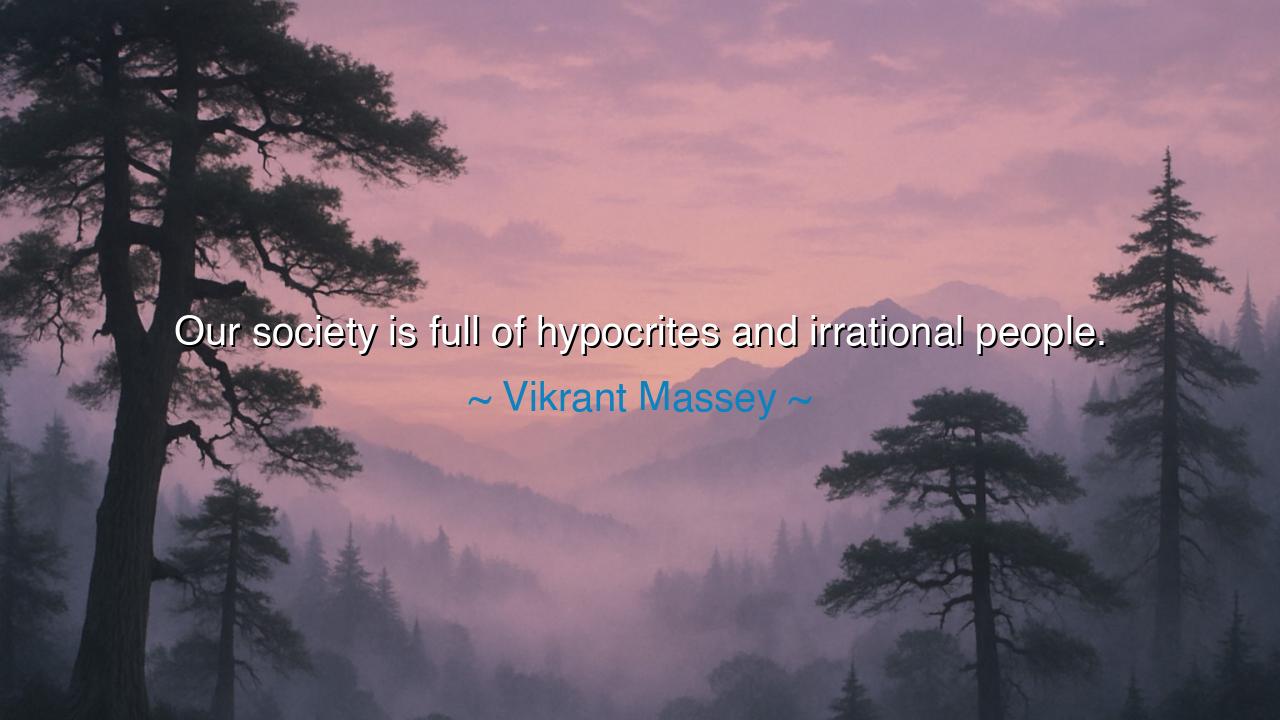
Our society is full of hypocrites and irrational people.






In the sacred halls of wisdom, where the ancient texts were passed from teacher to pupil, there echoes the voice of the philosopher who would raise their gaze to the world and speak plainly of the truths that lay hidden beneath the surface of society. And so it is, in the words of Vikrant Massey, “Our society is full of hypocrites and irrational people,” that we are confronted with a harsh but undeniable reflection of our times. These words strike like a clarion call, challenging us to open our eyes and see the world not as we wish it to be, but as it truly is.
In this moment, let us pause and consider the word hypocrite—a term that carries the weight of ages. It is the person who, through their actions, speaks a language that contradicts their words, a being who wears the mask of virtue while their deeds betray it. Hypocrisy is a disease of the soul, a corruption that rots the very foundation of society, for how can a people trust in one another if their leaders, their peers, and their families speak in one tongue and act in another? The hypocrite, in their dishonesty, undermines the very essence of community—for trust is the bond that holds all societies together. When that trust is shattered, it is not easily rebuilt.
But this irrationality—the second affliction that Massey speaks of—what is it but the consequence of minds unwilling to seek the truth? To be irrational is to act without reason, to make choices driven by fear, by emotion, or by some passing whim, rather than by logic, wisdom, and the pursuit of the greater good. Irrationality is the child of ignorance and prejudice, and its consequences ripple through the fabric of our world, causing chaos where there should be order, conflict where there should be peace.
Think, dear listener, of the tale of Rome, that great civilization whose rise and fall has been etched into the annals of history. In the days of its decline, the emperors and the elite, with their great power and wealth, acted as hypocrites, preaching virtue and order while indulging in excess and corruption. The common people, disillusioned by their leaders, turned to the irrational promises of demagogues who sought to manipulate their emotions for personal gain. In the end, the Roman Empire, once a beacon of civilization, fell into ruin—not because of the might of its enemies, but because its own people had abandoned reason and integrity, succumbing to the very forces that would destroy them.
Yet, as history shows us, this is not the fate of every society. There have been those who, in the face of hypocrisy and irrationality, have chosen to stand firm in their commitment to truth and righteousness. Take the example of Socrates, the ancient philosopher who, despite the hypocrisy of Athenian society and the irrationality of the charges against him, chose to live by his principles. He spoke the truth to the very people who sentenced him to death, refusing to abandon his pursuit of wisdom, even in the face of his own demise. Socrates was not swayed by the irrationality of those around him, nor did he stoop to the hypocrisy of appeasing the masses. His legacy endures because he chose to act with integrity, to stand as a beacon of reason in a sea of turmoil.
And so, the lesson of Massey’s words is clear: We must resist the hypocrisy that seeks to tear apart the bonds of society, and we must reject the irrationality that clouds our judgment and leads us astray. For in doing so, we reclaim our humanity. To live with integrity is to walk a difficult path, but it is the path that leads to true freedom and peace. It is not an easy journey, for the world is full of temptations and distractions, and the hypocrites will always seek to lead us astray. But in the end, it is the pursuit of truth, of reason, and of justice that will guide us to the light.
Let us, then, in this very moment, choose to cast off the veil of hypocrisy and the chains of irrationality. Let us embrace the ideals of wisdom, integrity, and rational thought. We must strive, not for power, nor wealth, nor the fleeting approval of those around us, but for the truth that will set us free. It is in the quiet courage of those who stand for what is right, regardless of the challenges they face, that we find the true strength of our human spirit. May we all, like Socrates, walk the path of righteousness, even when the world around us falters. For in the end, it is not the hypocrites or the irrational who will be remembered, but those who had the strength to be true.






AAdministratorAdministrator
Welcome, honored guests. Please leave a comment, we will respond soon